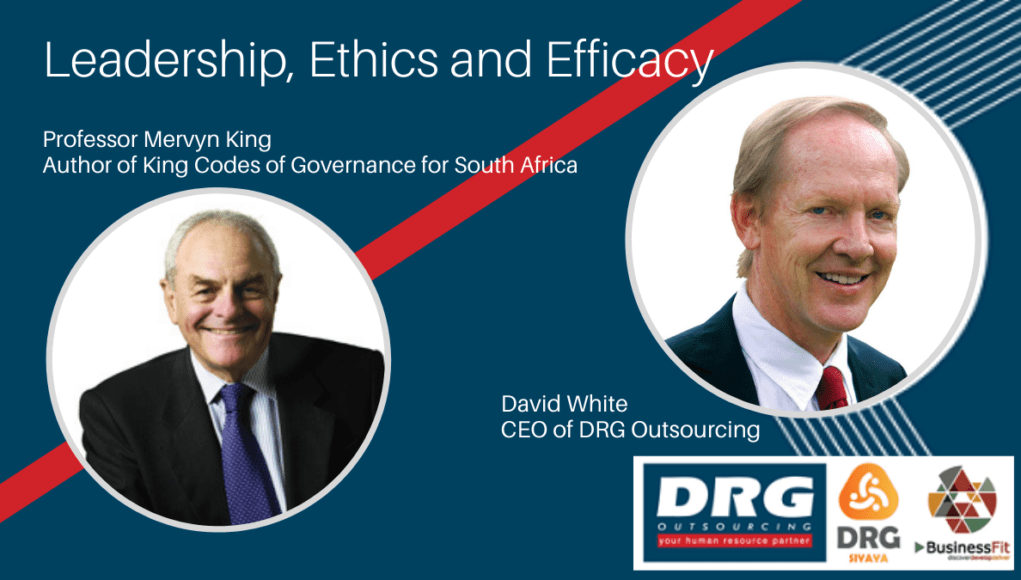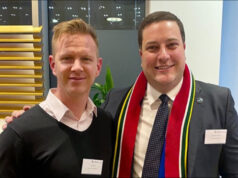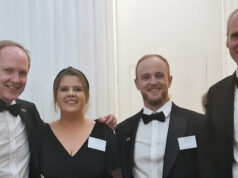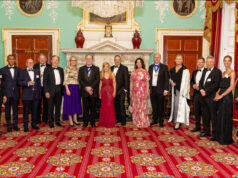An Interview with Professor Mervyn King, Author of the King Codes of Governance for South Africa
Written by David White, CEO Of DRG and BusinessFit
Edited by Kim Jansen for the South African Chamber of Commerce
An hour with South African Business legend and elder, Professor Mervyn King, is sure to leave an indelible mark. With an unparalleled background in law, business, leadership and integrated reporting, Professor King holds a global reputation for being a leading resource and authority in sustainability measures and corporate governance.
In just this hour of conversation with Professor King, discussing global governance and sustainability, David White’s understanding of the impact of leadership were forever changed.
The question posed to Professor King queried why South African business had not adopted a stated business framework of reporting that aligns with corporate governance principles to meet organisational expectations as well as stakeholder intentions.
Professor King agreed that “A common framework supporting activities and strategies to drive businesses towards meeting pre-defined outcomes is important in improving success rates of organisations in the markets – no matter how young or mature the businesses are in the economy.”
Addressing this thought further King explained that a critical consideration is certainly ethical and effective leadership from the governing body and assurance that the organisation is free from influences such as corruption, greed, and the like.
Professor King emphasised that some of the greatest minds on earth had been drawn together over the past decades to focus on models to support ESG initiatives, integrated reporting, and the development of manageable governance frameworks.
“While many of these fine minds, brought together for this purpose of improving business effective considerations, had different backgrounds and perspectives on organisational success, each had a valuable contribution to make in defining supportive business frameworks to result in more businesses being successful in the market,” furthered Professor King.
As the conversation continued, King highlighted the importance of conscious corporate leadership as the collective mind of any Board. Professor King also noted that, “One hopes that mankind does one day reach that point of evolution wherein a mature and caring fashion can share knowledge and kindness to others that seek to establish their value-creating pursuits, in the economy, for the betterment of communities, society, the environment, and the world at large.”
At this point, it was pointed out that the King Committee had recognised that the best frameworks ever conceptualised started with the concept that the organisation was incapacitated and its corporate leaders were the heart, mind, soul and conscience of the company.
Great value is given to organisations that meet legislative requirements to operate efficiently and to ensure value creation and process effectiveness. To support the aim of encouraging leaders and governing bodies to adopt ethical practices, the term Responsible Corporate Citizenship was created. This is the recognition by an organisation, no matter its incorporation, that it has legal, social, cultural and environmental responsibilities.
Being a responsible corporate citizen means being guided by moral and ethical standards in daily interactions with customers, stakeholders, and employees. It also means that one values, monitors and beneficially affects communities and societies at large; For example – constructively mining or harvesting, without absorbing more raw materials from the environment than can be replaced by nature herself within a reasonable period.
Lastly, the mantle of responsible corporate citizenship strengthens employee engagement and commitment, raises staffing energy levels, and enhances purpose and contribution from individuals and teams within the organisation.
Professor King’s emphasises that ethical, effective leadership and meeting responsible corporate citizenship expectations are more critical than merely providing a governance framework to guide business leaders and governing bodies towards achieving success and prosperity.
It has become clear that it is relatively easy for business leaders and organisational teams to follow processes to reach milestones and goals. However, when they are empowered to make collective decisions, they can, at times, become subjective and choose outcomes that positively affect their prosperity and hierarchical endeavours.
It should be executives’ ultimate aim to recognise their true responsibility as leaders and governing bodies and to act in the best interests of the health and sustainability of the organisation.
David White reveals that in just an hour, he particularly learnt from the great Professor King that business outcomes are directly affected by the simple processes of thinking, considerations and actions, adopted by business leaders.
White concludes “It is clear that maturity in the business leaders and governing bodies, who recognise their role in society as critical in creating engaging work environments that include community, environmental, social and governance considerations, are the guiding lights needed to help improve our collective and economic challenges.”
David White
DRG and BusinessFit have been focused on creating a business framework for organisations to use in assessing their organisational sustainability from an Environmental, Social and Corporate Governance aspect. In a nutshell, these guidelines allude to the development of communities and society as a whole whilst supporting the respectful use of raw materials and replenishment of the environment’s natural resources. Simultaneously, this framework follows governance guidelines on ethics and efficacy to improve businesses’ contribution to the creation of a sustainable economy.
Four critical pillars are brought to the fore, namely: leadership, ethics, and value creation; functional area foundation and quality assurance and controls; defined outcome intentions and stakeholder measurements, and; organisational culture effectiveness and staffing engagement levels.










